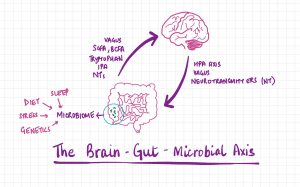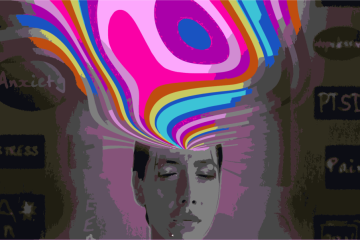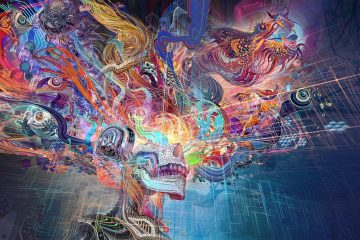Your body can encode about 25,ooo genes. But there’s another 5 million genes that are produced by the bacteria that live in your gut. That’s more than 99% of the total genetic material of your body! (1)
The gut is very commonly referred to as the ‘second brain’ of our body, and for very good reason. Not only does it contain about a million neurons that regulate digestion of food, but there are a huge variety of interconnections between the brain and the gut that have a bidirectional impact on both gut and brain processes. On one hand, your mental state and emotions can affect digestion, causing food cravings, bloating, diarrhoea and constipation. Simultaneously, your gut health can affect your mood, your thoughts and your overall health.
In fact, chronically poor gut health, stemming in most cases from an imbalance in one’s gut microbiome (i.e., collection of bacteria in your gut), a phenomenon called ‘dysbiosis’ has been implicated by many researches in causing diseases like anxiety, depression, Alzheimer’s, Parkinson, multiple sclerosis and even autism (2)(3). Disorders like Irritable Bowel Syndrome (IBS), that were previously considered to be ‘functional disorders’ (read ‘all in your head’), are now being considered as a result of this very dysregulation.
It sounds logical then that we would have spent tons of resources, time and manpower into understanding the brain-gut-microbiome axis in greater detail, right? However, while this discovery was made at least a hundred years ago, dedicated research into exactly how much our brain and gut ‘talk’ with each other has begun only very recently.
In fact, PubMed, which serves as the largest online database for medical articles, formalised the term ‘brain-gut axis’ as part of its standardised MeSH database this year itself.

So what exactly is this ‘brain-gut-microbiome axis’ and why should you care about it?
The gut and brain communicate not just via nerve cells, but also via hormones, immune system, autonomic nervous system, hypothalamus-pituitary axis and also, very importantly, the gut microbiota(4).
Here is a very simplistic representation of what it looks like.

There are over a 1000 different species of bacteria that live in our gut, and they exist in a ‘symbiotic association’ with humans, a win-win situation, where we act as home to the bacteria while they help us with digesting our food and also producing certain nutrient and vitamins that we need for survival.(5) Pretty neat.
We know the importance of microbes in our survival by having extensively studied germ-free (GF) animals (mostly mice) and how the absence of gut bacteria affects their physiology, neurobiology and even behavior!(5,6)
One of the ways scientists render these animals germ-less is by using antibiotics. It is the very same antibiotics that so many of us consume over-the-counter for even minor flus and viral infections (that have zero role of antibiotics). (7) You are essentially stripping your gut not just of the bad bacteria, but also the very important good ones. The fact that we are moving towards a more and more ‘aseptic’ world, with children not playing outside, regular hand washing and a generally decreased exposure to nature, is only adding to the problem.
We mentioned ‘dysbiosis’ before. It is at the heart of countless diseases that are rapidly increasing in prevalence in recent years. There are those 1000 different species of bacteria in our gut for a reason – all of them perform different functions. They are also in a constant competition with each other for resources.
Suppose you eat a diet predominant in fatty foods. In this case, bacteria that our capable of digesting oil, and that thrive in such environments will be selected over other bacteria, that were needed for other functions in our body, say, digesting complex carbs, or producing vitamin K. So your body is losing out on all these building blocks necessary for its proper growth and functioning, and leading to all sorts of diseases. The sad part is, sometimes the damage is done to the extent that it is almost impossible to restore a normal, healthy gut microbiome. (8)
If it sounds like I am trying to scare the hell out of you, I guess I am. This fear-mongering when it comes to your health, in my opinion, is justified. We are all slogging through lives trying to live happier and healthier, and in the very process of trying to achieve that, we are in fact, ruining our health, ignoring the root cause of illness and chasing only symptomatic relief in antacids, painkillers and to a large extent even in antidepressants.
90% of the serotonin, the ‘happy hormone’ of your body, and about 50% of dopamine, the hormone that motivates you to take action, are produced by the gut. (9)
No wonder then- happy gut, happy you. Equally important to remember is that- happy you= happy gut. This seems like a perpetual circle of doom, does it not? Your mood affects your gut and its bacteria, and they in turn further lower your mood. A very interesting study took fecal material (containing the person’s bacteria) from depressed individuals and transplanted it into healthy rats, and found that the psychiatric illness was also transferred to these previously healthy rats. (10)
So, is there a way out of this cycle then? Of course! And it starts with becoming aware of these gut-brain interactions, and making lifestyle changes that help regulate your gut, and your brain.
This topic is very close to my heart, and I intend on diving deeper into it in the coming posts, with more information and actionable tips. Hope you find it worth your time. For any feedback/ suggestions for future posts, please comment in the space below. It helps me, plus we can start conversations that can benefit other readers as well ?.
References-
- D’Argenio V, Salvatore F. The role of the gut microbiome in the healthy adult status. Clin Chim Acta. 2015 Dec 7;451:97–102.
- Oroojzadeh P, Bostanabad SY, Lotfi H. Psychobiotics: the Influence of Gut Microbiota on the Gut-Brain Axis in Neurological Disorders. J Mol Neurosci MN. 2022 Sep;72(9):1952–64.
- Serra D, Henriques JF, Sousa FJ, Laranjo M, Resende R, Ferreira-Marques M, et al. Attenuation of Autism-like Behaviors by an Anthocyanin-Rich Extract from Portuguese Blueberries via Microbiota-Gut-Brain Axis Modulation in a Valproic Acid Mouse Model. Int J Mol Sci. 2022 Aug 17;23(16):9259.
- Gut–brain axis. In: Wikipedia [Internet]. 2022 [cited 2022 Sep 3]. Available from: https://en.wikipedia.org/w/index.php?title=Gut%E2%80%93brain_axis&oldid=1105305545
- Cryan JF, O’Riordan KJ, Cowan CSM, Sandhu KV, Bastiaanssen TFS, Boehme M, et al. The Microbiota-Gut-Brain Axis. Physiol Rev. 2019 Oct;99(4):1877–2013.
- Scott GA, Terstege DJ, Vu AP, Law S, Evans A, Epp JR. Disrupted Neurogenesis in Germ-Free Mice: Effects of Age and Sex. Front Cell Dev Biol [Internet]. 2020 [cited 2022 Sep 3];8. Available from: https://www.frontiersin.org/articles/10.3389/fcell.2020.00407
- Patangia DV, Anthony Ryan C, Dempsey E, Paul Ross R, Stanton C. Impact of antibiotics on the human microbiome and consequences for host health. MicrobiologyOpen. 2022 Jan 13;11(1):e1260.
- TEDx Talks. Your Gut Microbiome: The Most Important Organ You’ve Never Heard Of | Erika Ebbel Angle | TEDxFargo [Internet]. 2019 [cited 2022 Sep 3]. Available from: https://www.youtube.com/watch?v=B9RruLkAUm8
- Stanford Health Care. Stanford Hospital’s Pankaj Pasricha discusses the Enteric Nervous System, or brain in your gut [Internet]. 2011 [cited 2022 Sep 3]. Available from: https://www.youtube.com/watch?v=UXx4WTVU34Y
- Knudsen JK, Michaelsen TY, Bundgaard-Nielsen C, Nielsen RE, Hjerrild S, Leutscher P, et al. Faecal microbiota transplantation from patients with depression or healthy individuals into rats modulates mood-related behaviour. Sci Rep. 2021 Nov 8;11(1):21869.



4 Comments
Vijay · September 3, 2022 at 8:41 pm
A great thread? Really impressive work done.
We Indians lack the most in understanding gut and the brain link.
Mridula · September 3, 2022 at 9:15 pm
Thanks 😀
Not just Indians, but most of the world does. It’s really sthg we’ve started paying attention to only recently.
Arnav Upadhyay · May 26, 2025 at 12:01 pm
Great read! Would love follow ups on this one
Mridula · May 26, 2025 at 1:23 pm
Appreciated, thanks!